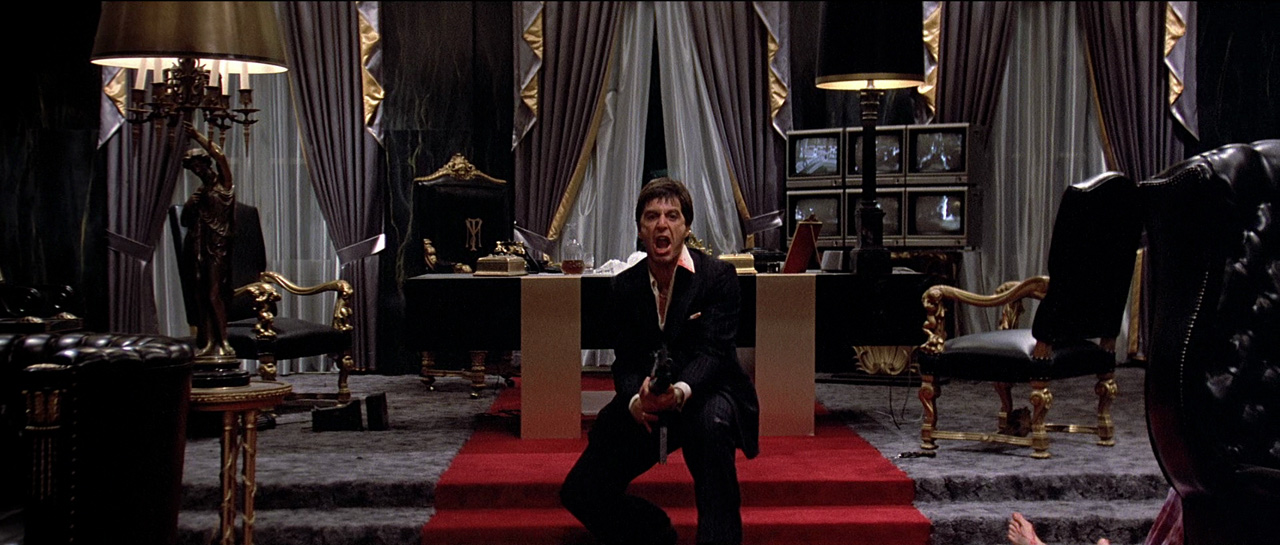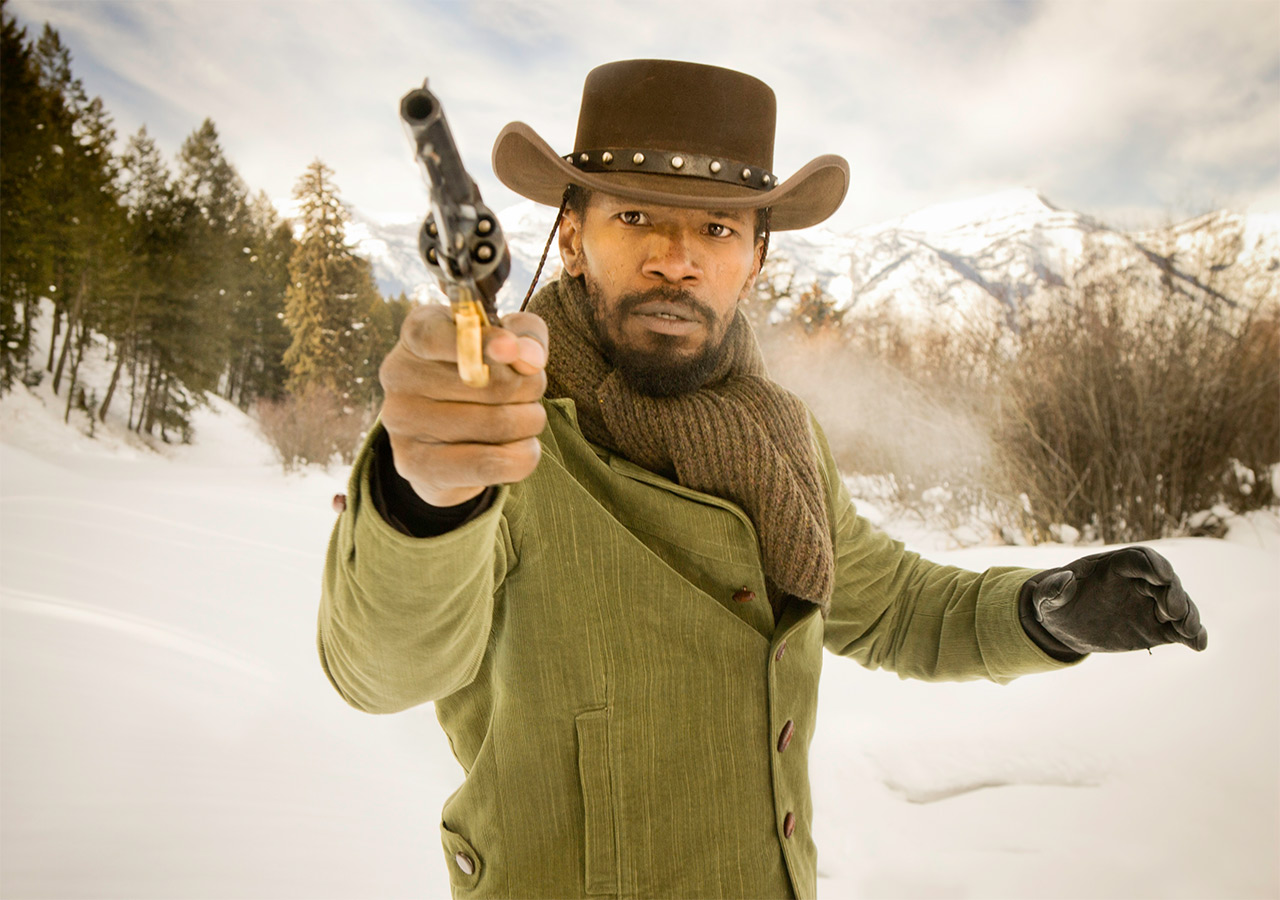Gran Torino
 The genius of Clint Eastwood is evident in the fact that nobody else could get away with this. Gran Torino is by most measures a pathetically undercooked melodrama, relying on stock characters, trite dialogue, and a lot of awkward performances by untrained amateurs and unseasoned pros. The backdrop of tradition-rich Hmong families struggling to adapt to the American midwest without losing both their culture and their souls is the kind of social conflict that could drive any generic indie picture, and Eastwood himself plays the kind of character whose arc can be described in a half-dozen words: crotchety coot gets heart of gold. Eastwood doesn't even turn in an especially adept performance from a technical standpoint, although I guess he never really does. He hasn't much range. Despite that, he's one of the greatest stars in contemporary cinema — a laconic, iconic presence who's come to represent both artisanal and populist impulses in American film, to simultaneously articulate conservative and liberal ideals, to split the difference between the gruff misanthrope and the sensitive man of letters. That's how, even when he's thrown a slow, wonky pitch like Gran Torino, he manages to pretty well knock the ball out into the bleachers just the same. The guy heading into the theater to clean up cups and popcorn bags nodded at me as I left and muttered, "Clint was robbed by the Academy, right?" That's star power.
The genius of Clint Eastwood is evident in the fact that nobody else could get away with this. Gran Torino is by most measures a pathetically undercooked melodrama, relying on stock characters, trite dialogue, and a lot of awkward performances by untrained amateurs and unseasoned pros. The backdrop of tradition-rich Hmong families struggling to adapt to the American midwest without losing both their culture and their souls is the kind of social conflict that could drive any generic indie picture, and Eastwood himself plays the kind of character whose arc can be described in a half-dozen words: crotchety coot gets heart of gold. Eastwood doesn't even turn in an especially adept performance from a technical standpoint, although I guess he never really does. He hasn't much range. Despite that, he's one of the greatest stars in contemporary cinema — a laconic, iconic presence who's come to represent both artisanal and populist impulses in American film, to simultaneously articulate conservative and liberal ideals, to split the difference between the gruff misanthrope and the sensitive man of letters. That's how, even when he's thrown a slow, wonky pitch like Gran Torino, he manages to pretty well knock the ball out into the bleachers just the same. The guy heading into the theater to clean up cups and popcorn bags nodded at me as I left and muttered, "Clint was robbed by the Academy, right?" That's star power.
Eastwood's Walt Kowalski is a septuagenarian retiree living outside Detroit in a suburb that was, once upon a time, a community of auto workers and their families. He scorns his family of ingrates, a persistent clergyman (Christopher Carley), and especially his new next-door neighbors — Asian immigrants who are letting the yard go to hell. Their young son, Thao (Bee Vang), has fallen in with the wrong crowd and Walt nearly shoots him dead when he catches him trying to steal his Gran Torino, a prized souvenir from his days on the Ford assembly line, as part of a gang initiation ritual. Movies being what they are, the old guy sees something he likes in the kid and takes him under his wing, ushering him into a construction job and teaching him to talk smack. And because the kid needs protecting from the local toughs, it comes in handy that Walt talks like a mean old man and acts like an even meaner one. As the conflict escalates, part of the pleasure of watching Gran Torino is wondering how Kowalski intends to turn himself into a one-man Neighborhood Watch.
Auteurism remains the default setting for most American film criticism, which still prizes the history and worldview of the director above that of any other filmmaker. Eastwood has never been an auteur in the strictest sense — he never takes a screenplay credit, opting instead to work with a grab bag of writers, not just Oscar perennials like Paul Haggis, but less likely choices: Babylon 5 impresario J. Michael Straczynski (Changeling) and the erstwhile political scholar William Broyles Jr. (Flags of Our Fathers). His decision to film this low-key script by rookie Nick Schenk with minimal fuss paid off because it could shot in a hurry, and with minimal studio interference. The trade-off is the film's decidedly rough-hewn quality. Some would (accurately) call it clumsy, and blunt would be a generous descriptor. Try to read the screenplay — I dare you. This stuff is just dead on the page. Still, its first-draft feel is the antithesis of Hollywood's long-standing tendency to work and overwork, turning the rough stuff into gloss, and despite frequent cringeworthy moments it has a kind of appeal.
God knows there's plenty Gran Torino's hypothetical script doctor would have fixed, given time and money enough to do the job. A more seamless expository strategy than the rookie dialogue scenes that plague the first couple of reels. For that matter, a more elegant approach to dialogue in general, which just doesn't work outside of Eastwood's mouth (and it doesn't always work there). A more nuanced, less ingratiating characterization of Thao's sassy but oh-so-wise sister, who comes across like a TV infomercial on behalf of the melting pot. A better way of dealing with the neighborhood's African-American contingent, represented by a trio of sexually threatening loiterers whom Walt inexplicably refrains from referring to in language equivalent to the "slope" and "zipperhead" stingers he throws at their Asia-extracted counterparts. (Maybe the black kids, the established neighborhood Other, have somehow earned his respect in a way that the Hmong have not.) Tweaks to the dopey ending, which currently plays as a misplaced paean to the supposed efficiency and completeness of the American justice system — the same boondoggle that Eastwood's most famous character once upon a time worked to one-up and circumvent.
But here, Eastwood has proceeded under the assumption that finer points of scriptwriting are beside the point. What matters is that he gets to growl a line at some Hmong gang-bangers about how he "stacked fucks like you five feet high in Korea and used them as sandbags." That's a nightmare masquerading as a casual slur — and it's Eastwood's flinty, intense delivery that raises it above the level of a cartoonish remark and invests it with terrible gravity. It's funny because it's horrible, and the fact that it is funny just reminds you again of how horrible it is. Eastwood has an advantage over traditional auteurs in that, even though he doesn't write, he does appear in front of the camera, and his presence gives him a kind of authorial leverage. In Schenk's broad strokes is fashioned a crude framework to explore a character type that he's been working for years. Kowalski is another manifestation of the kind of angry-white-man zeitgeist that drove the Dirty Harry movies. Harry was angry because in his eyes the American legal system was favoring the perps rather than the victims. Walt's dilemma is more metaphysical. He's angry in part because his new neighbors don't share his own values of Detroit-built cars and tidy lawns, but also because he's been abandoned by his own people. His old neighbors are gone, his wife dead, his family as good as strangers. It's no country for old men. The old-timer is angry because he's a veteran and, in contemporary America, he's not sure what that gets him. And, like Harry Callahan, Walt Kowalski just enjoys being angry. He revels in the power it gives him.
That Gran Torino is the story of the angry white guy's eventual redemption is a sign that the geezer-auteur has, maybe, mellowed with age. (The famously Republican Eastwood says he favors gun control — one of those stances that seems especially untenable for a self-described libertarian.) That it's funny indicates that Eastwood hasn't lost his mind, or his facility for self-deprecation. When Kowalski growls at his neighbors, his priest, and his daughter's navel ring, it's an invitation to chuckles. And when, backed by the kind of firepower he hasn't packed since Unforgiven, he finally unleashes that most pervasive of cranky-old-fart memes — snarling, "Get off my lawn" as he levels an army-strong rifle at some punk kids he'd like to turn into lawn ornaments — the mood is tense, giddy, and utterly pulpy.
Just as Eastwood's tormented conscience saved the almost unbearably moving Million Dollar Baby from melting away in its own teary backwash, it saves Gran Torino from playing as an exercise in mere bathos. It amplifies and clarifies old man Kowalski's crisis of faith, his outwardly alarming but ultimately insincere racism, and his loss of confidence in the American dream, embodied by the Ford plant down the road and the still-gleaming product that rolled off its lines in the better days of 1972. (Walt, like Eastwood, surely voted for Nixon.) Seen by those lights, Gran Torino is an ideal Eastwood project, falling squarely in the category of working-class seriocomedy. Certainly it's never good enough that it deserves to be taken entirely seriously. Real-life racists are generally meaner and uglier than Kowalski, whose granstanding verbiage represents general misanthropy at worst and situational xenophobia at best. That he will ultimately prove himself to be worthy of the admiration he grudgingly accepts is never in doubt, and thus his ultimate gesture of selflessness initially falls flat. But toward the very end of the film, you see one of Kowalski's neighbors — his newest and best friends — step onto the front porch in ornate, traditional Hmong garb. It's almost a throwaway moment, barely scripted, but still it catches in the throat. It's not profound because it's cleverly written or finely observed, but because of the elegy it represents in context. And it crystallizes the film's irony — it's Kowalski himself, rather than the immigrant families who have transformed his shabby neighborhood, who ends up assimilating.
Posted by on February 4, 2024 9:20 PMGet Gran Torino on Blu-ray pr DVD from Amazon.com

